| Srl | Item |
| 1 |
ID:
187157
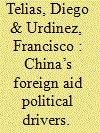

|
|
|
|
|
| Summary/Abstract |
This study investigates a novel dataset comprised of a universe of 537 donations in 33 countries in Latin America and the Caribbean, between 11 February and 20 June 2020, which provides a high level of detail on China’s and Taiwan’s mask diplomacy. We describe who the main donors were, who the main recipients were, what was donated to each country, and which variables explain why some countries received more aid than others. Drawing on previous literature, the article advances understanding about the political determinants of these donations. Our findings revealed that, although seemingly uncoordinated, donations made by China’s central government, Chinese companies, cities, and foundations were strongly affected by two political determinants, namely the recipient’s partnership status with China and the One China Policy. Furthermore, aid provided by China’s Central Government was larger in autocracies than in democracies.
|
|
|
|
|
|
|
|
|
|
|
|
|
|
|
|
| 2 |
ID:
179102
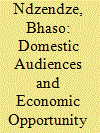

|
|
|
|
|
| Summary/Abstract |
This paper expands upon a hitherto underexplored finding by Rich and Banerjee’s 2015 model which finds that Taiwan has done comparatively better with non-democracies in Africa. The paper proposes that democratisation makes an African state more responsive to domestic economic imperatives and thus more likely to form relations with the demographically and economically larger People’s Republic of China because of the prospective trade, aid and investment gains to be made once such a switch is affected. Seven case studies conducted over the 2001–2018 period yield results which are in line with this hypothesis.
|
|
|
|
|
|
|
|
|
|
|
|
|
|
|
|
| 3 |
ID:
152152
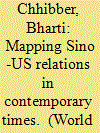

|
|
|
|
|
| Summary/Abstract |
Sino-American perceptions of global order vary drastically and they do not share many security interests or political values. Present distrust between the U.S. and China is based on conflicting strategic, economic, and ideological perspectives. America’s denouncement of one-China policy under President Trump seems to be a strategy to manage increasingly assertive China. It is widely believed in America that with the rise in China’s economic and military power it is becoming more expansionary and intend to be a threat to freedom of navigation in the South China and East China seas, as well as a threat to the security of the U.S. allies in the region—primarily Japan, South Korea and Australia.
|
|
|
|
|
|
|
|
|
|
|
|
|
|
|
|
| 4 |
ID:
152157


|
|
|
|
|
| Summary/Abstract |
It is true that Taiwan is no more important to US in 2017 as it was in 1972. Accepting the OCP never moved the central reality of Taiwan-US relations, but it gave protection for the Chinese in a strategic framework that has long ago vanished. Although strong China US ties are beneficial for both economies, however, replaying OCP or phone conservations as card is something premature to guess.
|
|
|
|
|
|
|
|
|
|
|
|
|
|
|
|
| 5 |
ID:
129684


|
|
|
|
|
| Publication |
2014.
|
| Summary/Abstract |
As China moves onto becoming a responsible power as its international image, it nevertheless fails to pronounce one of the most important and recent foreign policy it has enumerated. One China policy has been originally applied to Taiwan to imply and express that there is only state called China governed by the Peoples Republic of China (PRC). The Taiwanese identified themselves as separate from mainland China with its own constitution and political party and leader being elected by the people. But the PRC assertion over the claim on Taiwan has made PRC to conveniently seek for diplomatic relation around the word and to pressurize nations to break off their official relations with Taiwanese government.
|
|
|
|
|
|
|
|
|
|
|
|
|
|
|
|
| 6 |
ID:
192118
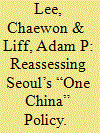

|
|
|
|
|
| Summary/Abstract |
Amid U.S.-led efforts to “internationalize and multilateralize” support for Taiwan in response to mounting pressure from China, the 2021 U.S.-South Korea presidential statement’s unprecedented reference to “peace and stability across the Taiwan Strait” made global headlines. This study analyzes contemporary Korea-Taiwan relations in historic and comparative perspective, focusing especially on Seoul’s official 1992 position on “One China” and its implications for Korea’s Taiwan policy. It demonstrates that Seoul has never recognized Beijing’s self-defined “One China principle” concerning its essential claim of PRC sovereignty over Taiwan. Comparative analysis of Korea’s position and subsequent policies with the U.S.’, Japan’s, and others’ further reveals significant (potential) flexibility in Korea’s approach to Taiwan. The relatively distant state of Korea-Taiwan relations today is the collective political choice of Korea’s democratically-elected leaders—not the legacy of some (non-existent) putative commitment made to Beijing 30 years ago.
|
|
|
|
|
|
|
|
|
|
|
|
|
|
|
|
| 7 |
ID:
128893


|
|
|
| 8 |
ID:
188799
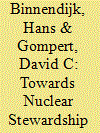

|
|
|
|
|
| Summary/Abstract |
With the rising risk of complex crises and military escalation in the Pacific region, the United States should invite China into a process of nuclear restraint and confidence-building, which we call ‘nuclear stewardship’. This process could start with a joint bilateral declaration that neither superpower would use nuclear weapons first against the other or its formal allies. This would acknowledge that neither side could gain by striking first with a nuclear device. This declaration could be the leading edge of a broader set of discussions on strategic stability and eventual implementation of confidence-building measures designed to enhance mutual understanding and trust in the US–Chinese nuclear relationship.
|
|
|
|
|
|
|
|
|
|
|
|
|
|
|
|
| 9 |
ID:
152154
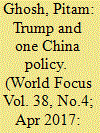

|
|
|
|
|
| Summary/Abstract |
Beijing has repeatedly made it unequivocally clear that Taiwan is the most important of its core interests. If the incoming U.S. administration actively challenges the One China policy, Beijing will certainly and resolutely strike back, leading to diplomatic confrontations or even military conflicts. If Trump would like to have a war with China to prove the United States is great again, then he should keep testing Beijing’s redline on Taiwan. Perhaps Trump will change his mind and adhere to long-standing U.S. policy on Taiwan.
|
|
|
|
|
|
|
|
|
|
|
|
|
|
|
|
| 10 |
ID:
153329
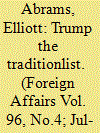

|
|
|
| 11 |
ID:
152153


|
|
|
|
|
| Summary/Abstract |
The ‘One China Policy’ has played a pivotal role in shaping the Sino-U.S official relations since the end of Chinese Civil war in 1949. Moreover it is a fundamental bedrock in shaping the contours of Chinese foreign policy and diplomacy. Therefore it becomes a mandatory recognition on the part of countries and nations worldwide to recognize Peoples Republic of China (PRC) as being ‘One China’ and Taiwan- Republic of China (ROC), merely being a part of it.
|
|
|
|
|
|
|
|
|
|
|
|
|
|
|
|
| 12 |
ID:
164244
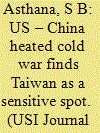

|
|
|
| 13 |
ID:
152147


|
|
|
|
|
| Summary/Abstract |
‘One Country two Systems’, ‘One China Policy’ and ‘Middle Kingdom Complex’ and so on and so forth, have been the descriptions attributed to the People’s Republic of China (PRC). The PRC inherits these titles from its history – both colonial and modern. For an outsider China looks one, but it is not one in the technical sense. In contrast, though, India has had some similar colonial characteristics marked by heterogeneity but India is one, a unified whole having a similar political system in all parts of the country.
|
|
|
|
|
|
|
|
|
|
|
|
|
|
|
|
| 14 |
ID:
143692


|
|
|
|
|
| Summary/Abstract |
This essay analyzes the interactions between two competing powers, China under the Chinese Communist Party, and Taiwan, a democracy, for the future of Taiwan. It provides background on how Taiwan became a non-resolvable issue since the Communists defeated the Kuomintang government on the Chinese mainland in a civil war from 1945–1949. Then the two sides developed into two different political systems: the People's Republic of China—a one-party state controlled by the Chinese Communist Party; and the Republic of China on Taiwan—a multi-party democracy espousing multiple political ideologies. This essay offers the author's predictions for the future.
|
|
|
|
|
|
|
|
|
|
|
|
|
|
|
|